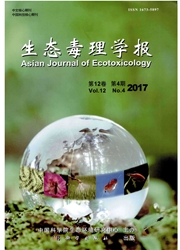

 中文摘要:
中文摘要:
阿尔茨海默病(Alzheimer's disease,AD)是一种神经退行性疾病,其主要病理特征包括脑内出现老年斑和神经纤维缠结以及神经元缺失。过渡金属离子如Fe^(2+)、Zn^(2+)、Cu^(2+)等会在AD病人脑中大量蓄集,从而促进,-淀粉样多肽(Aβ)聚集并产生大量活性氧自由基,引起细胞功能改变。硒蛋白R(Sel R)是一种蛋氨酸亚砜还原酶,可将蛋白中的蛋氨酸亚砜还原为蛋氨酸。然而Sel R与金属离子的关系尚无报道。文章对Sel R的突变体Sel R'(Sel R中硒代半胱氨酸Sec95突变为半胱氨酸Cys95)结合Cu^+的性质进行了表征,同时也对Sel R'调节Cu^+/Cu^(2+)诱导的Aβ42聚集和细胞毒性的能力进行了研究。结果表明,Sel R'可与Cu^+特异性螯合剂BCA竞争结合Cu^+,说明Sel R'具有较强的Cu^+结合能力。采用硫磺素荧光法(Th T),发现Cu^+/Cu^(2+)显著性抑制Aβ42的纤维化、诱导其形成非纤维化聚集体,而Sel R'则能够显著抑制Cu^+/Cu^(2+)诱导的Aβ42聚集形态的改变。细胞实验表明:Sel R'能显著降低Cu^+/Cu^(2+)诱导的Aβ42的细胞毒性。上述结果提示:Sel R在脑内除了还原蛋氨酸亚砜,还可通过与铜离子的结合抑制其细胞毒性作用,从而干预AD的发展。
 英文摘要:
英文摘要:
Alzheimer's disease(AD) is a neurodegenerative disease characterized by the deposition of senile plaques and neurofibrillary tangles together with the loss of neurons in the brain. Previously, copper, iron and zinc ions were found with large amounts in the brains of AD patients. Metal ions can promote the aggregation of,-amyloid peptide(Aβ) and lead to the formation of reactive oxygen species which further result in extensive impairment of cellular functions. Selenoprotein R(Sel R) plays an important role in maintaining intracellular redox balance by reducing methionine sulfoxide to methionine. However, no report has been published on the relationship between Sel R and metal i-ons. In this study, we characterized the Cu+binding property of Sel R'(a Sec-to-Cys mutation form of Sel R) and investigated its ability to modulate the aggregation and neurotoxicity of Aβ42induced by Cu+/Cu^(2+). The results showed that Sel R' could compete for Cu+with bicinchoninic acid(BCA), a specific Cu+chelator, suggesting the high binding affinity between Sel R' and Cu+. Using thioflavine T fluorescence assay, it was observed that Cu+/Cu^(2+)binding to Aβ42almost completely suppressed Aβ42fibrillization, leading to the non-fibrillar aggregation of Aβ42, which could be significantly restored by Sel R'. Using living cells, Sel R' was also found to inhibit Cu+/Cu^(2+)-Aβ42induced neurotoxicity. Results in this study indicated that Sel R in the brain can not only reduce methionine sulfoxide, but also bind excessive copper ions to inhibit their toxic effects, which will be beneficial for the intervention of AD progress.
 同期刊论文项目
同期刊论文项目
 同项目期刊论文
同项目期刊论文
 期刊信息
期刊信息
